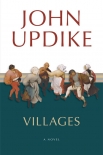Villages, John Updike [brene brown rising strong .TXT] 📗

- Author: John Updike
Book online «Villages, John Updike [brene brown rising strong .TXT] 📗». Author John Updike
So it was in the aggrieved, incredulous voice of a child who has been tricked that Julia, replacing the receiver after a phone call early the next morning, came back to the bedroom and announced to Owen, “Bumpy died!” Tears stood out in her eyes, making their aquamarine more vivid. Julia was a woman who even in the worst of times didn’t cry.
Middle Falls had seen other scandals and breakups, but this was of a novel order, a clergyman’s wife and a coolly arranged double split. Owen’s second son and third child, fifteen-year-old Floyd, named after his grandfather the accountant, brought home from school the news that Reverend Larson and his wife, of all people, were splitting up. Jennifer Pajasek, a girl in his grade who sometimes babysat for them, said they’d been fighting a lot and the children—a girl and a boy—were very upset.
Floyd could not see, as he relayed this news to his father in a voice of puzzled, titillated innocence, that it was news about himself, the first crack of a doom about to descend on his own head. In a parsonage two miles away, events had been set in motion. Owen had been drawn into that pit of fatality whose rim had been marked so many years ago by the sound of Danny Hoffman pulling the trigger of his father’s Army-issue Colt .38 before dawn, two houses up Mifflin Avenue. Now this was at four-thirty in the afternoon, on a bright September day at the kitchen table in the six-bedroom, four-bathroom Mackenzie house on Partridgeberry Road, but the realm was the same, the realm of irrevocable real harm. He was his own child’s executioner. The gun was still hidden behind his back but in a few days would have to be taken out and fired. His son would become, like Buddy Rourke, fatherless, his father having strayed. Phyllis already knew. The town would soon know. There was no hiding, no going back. Beyond the kitchen windows, blameless life sounded its songs, as detached from human guilt as a dream—starlings clattering as they gathered in flocks for migration, insects invisibly stridulating as the summer wound up its business.
Julia led the way—the first to spill the beans, the first to separate, the first to divorce. Though Owen desired her, and saw in her his chance to settle safely into married concupiscence and obedience, he might have lagged indefinitely, keeping women in the air like a juggler’s gaudy balls, had she not shamed him out of it. Shock at her own fall had galvanized her; the doubt-free momentum acquired when she had been virtuous carried her along. She never looked back, and he weakly followed.
The announcements to his children, the move to an apartment in the slummy row houses across the river from the old mill, the interview with a jaded, non-judgmental Hartford divorce lawyer—these all had an underwater quality. He moved numbly through a thickness of others’ pain, scarcely recognizing himself. In this thicker element, he felt oddly light. There was a sensation that, in entering the drastic element—the fatality he confused with the vacant lot next to his first home, where his glasses in their dew-soaked case had been miraculously returned to him, convincing him that his life was charmed—Owen had begun his delayed adulthood. Leaving Phyllis in their mid-forties was the first adult action of his life. To be an adult is to be a killer. Pacifists and non-combatants are just fooling themselves, letting others do the dirty work.
Vanessa, meeting him downtown at noon, outside The Ugly Duckling, said simply, unsmiling, “Good for you, dear,” but kept walking. Alissa, crossing Branch Street to the elementary school with little Nina in tow, asked the child, “Want to show Mr. Mackenzie where your tooth came out?” Karen Jazinski had knocked once, that summer, on the door of Owen’s cell at E-O; since Julia was





Comments (0)